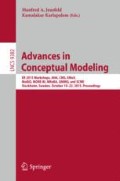Abstract
In this paper we present our experience in the experimental development and use of simulation instrument for learning object-oriented conceptual modeling in a master level course on analysis and design of information systems. The focus of our research is on the teaching of one particular topic in object-oriented conceptual modeling - inheritance. The results from the pilot experimental study (with a student sample N = 32), demonstrate a positive effect of simulation-based learning method on the understanding by novice business analysts of the concept of inheritance when applied in a conceptual model.
Access this chapter
Tax calculation will be finalised at checkout
Purchases are for personal use only
Notes
- 1.
The course page can be found on http://onderwijsaanbod.kuleuven.be/syllabi/e/D0I71AE.htm.
- 2.
- 3.
MERODE is an Object Oriented Enterprise Modeling method. Its name is the abbreviation of Model driven, Existence dependency Relation, Object oriented DEvelopment. Cfr. http://merode.econ.kuleuven.be.
References
Vazquez, G., Pace, J.A.D., Campo, M.: Reusing design experiences to materialize software architectures into object-oriented designs. Inf. Sci. 259, 396–411 (2014)
Booch, G.: Object Oriented Analysis & Design with Application. Pearson Education India, Redwood (2006)
Booch, G.: Object-oriented development. IEEE Trans. Softw. Eng. 2, 211–221 (1986)
Northrop, L.M., Object‐Oriented Development. Encyclopedia of Software Engineering (1994)
Capretz, L.F.: A brief history of the object-oriented approach. ACM SIGSOFT Softw. Eng. Notes 28(2), 6 (2003)
Pastor, O., Insfrán, O., Pelechano, V., Ramírez, S.: Linking object-oriented conceptual modeling with object-oriented implementation in Java. In: Tjoa, A.M. (ed.) DEXA 1997. LNCS, vol. 1308. Springer, Heidelberg (1997)
Siau, K., Loo, P.-P.: Identifying difficulties in learning UML. Inf. Syst. Manage. 23(3), 43–51 (2006)
Erickson, J., Keng, S., Can UML be simplified? practitioner use of UML in separate domains. In: Proceedings of the 12th Workshop on Exploring Modeling Methods for Systems Analysis and Design (EMMSAD 2007), Held in Conjunctiun with the 19th Conference on Advanced Information Systems (CAiSE 2007), Trondheim, Norway (2007)
Barjis, J., et al.: Innovative teaching using simulation and virtual environments. Interdisc. J. Inf. Knowl. Manage. 7, 237–255 (2012)
Kluge, A.: Experiential learning methods, simulation complexity and their effects on different target groups. J. Educ. Comput. Res. 36(3), 323–349 (2007)
Damassa, D.A., Sitko, T.: Simulation technologies in higher education: uses, trends, and implications. EDUCAUSE Center for Analysis and Research (ECAR), Research Bulletins (2010)
European Commission, Opening up education: Innovative teaching and learning for all through new technologies and open educational resources. Communication from the commission to the European parliament, the council, the European economic and social committee and the committee of the regions (2013)
Sedrakyan, G., Snoeck, M.: A PIM-to-Code requirements engineering framework. In: Modelsward 2013-1st International Conference on Model-driven Engineering and Software Development-Proceedings (2013)
Sedrakyan, G., Snoeck, M.: Lightweight semantic prototyper for conceptual modeling. In: Indulska, M., Purao, S. (eds.) ER Workshops 2014. LNCS, vol. 8823, pp. 298–302. Springer, Heidelberg (2014)
Sedrakyan, G., Snoeck, M.: Technology-enhanced support for learning conceptual modeling. In: Bider, I., Halpin, T., Krogstie, J., Nurcan, S., Proper, E., Schmidt, R., Soffer, P., Wrycza, S. (eds.) EMMSAD 2012 and BPMDS 2012. LNBIP, vol. 113, pp. 435–449. Springer, Heidelberg (2012)
Sedrakyan, G., Snoeck, M., Poelmans, S.: Assessing the effectiveness of feedback enabled simulation in teaching conceptual modeling. Comput. Educ. 78, 367–382 (2014)
Liberman, N., Beeri, C., Kolikant, Y.B.-D.: Difficulties in learning inheritance and polymorphism. ACM Trans. Comput. Educ. (TOCE) 11(1), 4 (2011)
Hadar, I., Leron, U.: How intuitive is object-oriented design? Commun. ACM 51(5), 41–46 (2008)
Sedrakyan, G., Snoeck, M., De Weerdt, J.: Process mining analysis of conceptual modeling behavior of novices empirical study using jmermaid modeling and experimental logging environment (accepted). Comput. Hum. Behav. 41(2), 486–503 (2014)
Rumbaugh, J.: Disinherited-Examples of misuse of inheritance. J. Object-Oriented Program. 5(9), 22–24 (1993)
Deligiannis, I.S., et al.: A review of experimental investigations into object-oriented technology. Empir. Softw. Eng. 7(3), 193–231 (2002)
Nelson, H.J., et al.: A conceptual modeling quality framework. Softw. Qual. J. 20(1), 201–228 (2012)
Author information
Authors and Affiliations
Corresponding author
Editor information
Editors and Affiliations
Rights and permissions
Copyright information
© 2015 Springer International Publishing Switzerland
About this paper
Cite this paper
Sedrakyan, G., Snoeck, M. (2015). Effects of Simulation on Novices’ Understanding of the Concept of Inheritance in Conceptual Modeling. In: Jeusfeld, M., Karlapalem, K. (eds) Advances in Conceptual Modeling. ER 2015. Lecture Notes in Computer Science(), vol 9382. Springer, Cham. https://doi.org/10.1007/978-3-319-25747-1_32
Download citation
DOI: https://doi.org/10.1007/978-3-319-25747-1_32
Published:
Publisher Name: Springer, Cham
Print ISBN: 978-3-319-25746-4
Online ISBN: 978-3-319-25747-1
eBook Packages: Computer ScienceComputer Science (R0)

